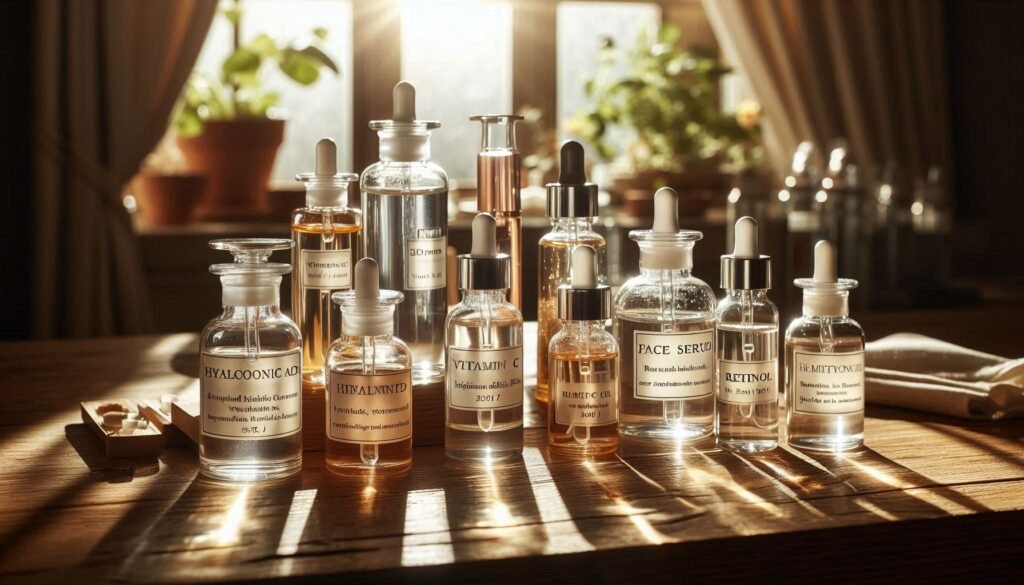
Table Of Contents:
(Click And Go Directly)
As we age, our skin undergoes many changes. It can become drier, less elastic, and more prone to fine lines and wrinkles. Choosing the right face serum is essential to maintaining youthful, radiant skin. But with so many options available, it can be challenging to know which serum will best meet your needs.
This guide will help you understand how to choose a face serum for older skin, focusing on key ingredients, application tips, and recommendations to help you make an informed decision.
1. What Is A Face Serum?
A face serum is a specialized skincare product designed to deliver concentrated ingredients directly into the skin. Unlike moisturizers, serums are usually lightweight and have a higher concentration of active ingredients. They can target specific skin concerns, such as aging, dryness, or pigmentation. For older skin, serums can help address common issues like loss of elasticity, fine lines, and uneven skin tone.
2. Why Older Skin Needs A Serum?

As we age, the skin’s natural ability to produce moisture and repair itself diminishes. A face serum can provide essential nutrients and hydration to counteract these changes. Here’s why incorporating a serum into your skincare routine can be beneficial:
- Boosts Hydration: Serums can deeply penetrate the skin, delivering moisture where it’s needed most.
- Reduces Fine Lines and Wrinkles: Many serums contain ingredients that help smooth out wrinkles and improve skin texture.
- Improves Skin Elasticity: Ingredients in serums can help promote collagen production, enhancing skin firmness and elasticity.
- Evens Skin Tone: Serums can help reduce age spots and uneven skin tone, giving you a more radiant complexion.
4. Key Ingredients In A Older Skin Serum
When selecting a face serum for older skin, focus on ingredients that address the signs of aging and support skin health. Here are some essential ingredients to consider:
1. Retinol
Retinol, a form of Vitamin A, is well-known for its ability to reduce the appearance of fine lines and wrinkles. It works by increasing cell turnover and stimulating collagen production.
2. Hyaluronic Acid
Hyaluronic acid is a powerful moisturizer that attracts and retains water, helping to plump up the skin and reduce the appearance of fine lines.
3. Vitamin C
Vitamin C is an antioxidant that brightens the skin, reduces dark spots, and helps with collagen production, which is crucial for maintaining skin elasticity.
4. Peptides
Peptides are short chains of amino acids that can help stimulate collagen production and improve skin texture and firmness.
5. Niacinamide
Niacinamide, or Vitamin B3, helps to improve skin texture, reduce inflammation, and even out skin tone.
6. Ceramides
Ceramides help to restore the skin barrier and retain moisture, making them essential for maintaining hydrated, plump skin.
Here’s a table of all the key ingredients to look for in a face serum for older skin:
| Ingredient | What It Does |
|---|---|
| Retinol | Reduces fine lines, wrinkles, and improves skin texture. |
| Hyaluronic Acid | Hydrates and plumps the skin, reducing fine lines. |
| Vitamin C | Brightens skin tone and helps with collagen production. |
| Peptides | Stimulates collagen production and improves firmness. |
| Niacinamide | Improves texture, reduces inflammation, and evens out skin tone. |
| Ceramides | Restores the skin barrier and helps retain moisture. |
4. What To Avoid In Serums For Older Skin

When selecting a serum for older skin, it’s just as important to know what ingredients to avoid as it is to choose the right ones. Here are some ingredients that could potentially do more harm than good for aging skin.
A. Harsh Retinoids: While retinoids can reduce wrinkles, strong concentrations can cause irritation, dryness, and flakiness in older skin. It’s better to use gentle, time-released formulations or seek alternatives like bakuchiol.
B. Alcohol-Based Ingredients: Alcohol can dry out the skin and damage the moisture barrier, which is especially problematic for older skin that tends to be drier and more delicate.
C. Fragrances and Dyes: Artificial fragrances and dyes can lead to irritation or allergic reactions, especially in sensitive, aging skin. Opt for fragrance-free formulas to reduce the risk of skin sensitivity.
D. Sulfates: Sulfates can strip the skin of its natural oils, leading to increased dryness and irritation. For older skin, it’s essential to maintain moisture, so it’s best to avoid any sulfates in serums.
E. Parabens: Parabens are preservatives that may interfere with the skin’s natural balance and potentially disrupt hormone function. While studies are ongoing, avoiding parabens can be a safer choice for older skin that is already more vulnerable to environmental stressors.
By steering clear of these harsh or irritating ingredients, you can protect your skin’s health and ensure your serum delivers the benefits of hydration, smoothness, and radiance without unwanted side effects.
5. How To Apply A Face Serum

Applying your serum correctly ensures that you’re getting the most out of it. Follow these steps for optimal results:
Step 1: Cleanse Your Skin
Start with a clean face. Use a gentle cleanser to remove any dirt or makeup, allowing the serum to penetrate effectively.
Step 2: Apply Serum To Damp Skin
Apply a few drops of serum to slightly damp skin to help lock in moisture. Gently pat the serum onto your face, focusing on areas with fine lines or dryness.
Step 3: Follow With Moisturizer
After applying the serum, use a moisturizer to seal in the serum and provide additional hydration.
Step 4: Apply Sunscreen During the Day
If you’re using the serum in the morning, follow up with a broad-spectrum sunscreen to protect your skin from sun damage.
6. Variations Based On Your Skin Type
Different concerns may require different types of serums. Here’s how to choose based on your specific needs:
a. Wrinkles And Fine Lines
- Look for serums with retinol or peptides to boost collagen production and smooth wrinkles.
b. Dryness And Dehydration
- Choose serums with hyaluronic acid and ceramides to deeply hydrate and restore moisture.
c. Uneven Skin Tone
- Opt for serums with Vitamin C or niacinamide to brighten the skin and reduce dark spots.
d. Loss Of Elasticity
- Serums with peptides and Vitamin C can help improve skin firmness and elasticity.
7. Top 5 Serums For Older Skin

Here are some top-rated serums that can be beneficial for older skin:
1. SkinCeuticals C E Ferulic
A potent Vitamin C serum that brightens skin and reduces fine lines.
2. Olay Regenerist Retinol 24-Night Moisturizer
Combines retinol with a hydrating formula to improve skin texture and reduce wrinkles.
3. Neutrogena Hydro Boost Hydrating Serum
Features hyaluronic acid for deep hydration and plumping effects.
4. The Ordinary Buffet
A multi-peptide serum that targets signs of aging, including wrinkles and loss of elasticity.
5. CeraVe Hydrating Hyaluronic Acid Serum
Includes hyaluronic acid and ceramides to restore and maintain hydration.
8. Benefits Of Using A Face Serum
Using a face serum developed for older skin offers various key benefits:
- Enhanced Hydration: Face serums with ingredients like hyaluronic acid provide deep moisture, helping to combat dryness and keep the skin plump and hydrated.
- Reduction of Fine Lines and Wrinkles: Serums containing retinol and peptides can stimulate collagen production, which helps to smooth out fine lines and wrinkles, resulting in a more youthful appearance.
- Improved Skin Elasticity: Ingredients like peptides and Vitamin C promote collagen and elastin production, improving skin firmness and elasticity, which can reduce sagging and give a lifted look.
- Even Skin Tone: Serums with Vitamin C and niacinamide can help to brighten the skin and reduce the appearance of age spots, hyperpigmentation, and uneven skin tone, leading to a more radiant complexion.
- Restoration of Skin Barrier: Serums containing ceramides can restore the skin’s natural barrier, enhancing its ability to retain moisture and protect against environmental damage, which is crucial for older skin that may be more prone to sensitivity and dryness.
9. How Often Should You Use A Serum
For best results, use your serum twice a day—once in the morning and once at night. If your skin is sensitive, you may want to start with once a day and gradually increase usage.
Conclusion
Choosing the right face serum for older skin can make a significant difference in your skincare routine. Focus on serums with ingredients that address your specific concerns, such as retinol, hyaluronic acid, and Vitamin C. Avoid products with harsh chemicals or alcohol to ensure you’re not causing further irritation.
By selecting the right serum and applying it correctly, you can maintain youthful, radiant skin and address the common signs of aging effectively.
FAQs
So You have gotten all the answers about how to choose a face serum for older skin, or how to choose a face serum for older skin for men, or how to choose a face serum for older skin that suits your face…
Like This Also Read- How To Choose A Face Serum For Glowing Skin: A Complete Guide









